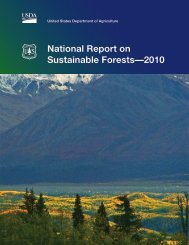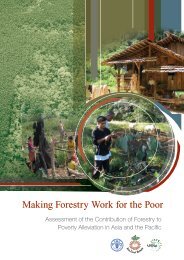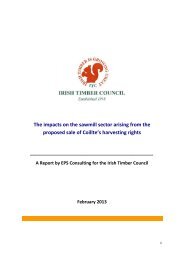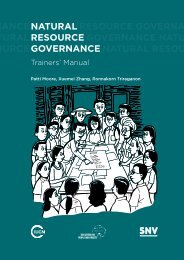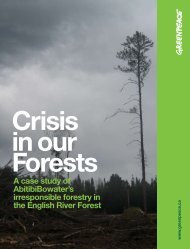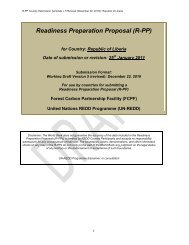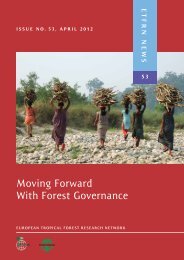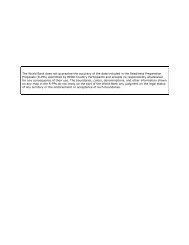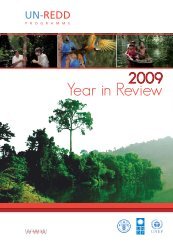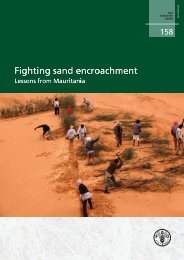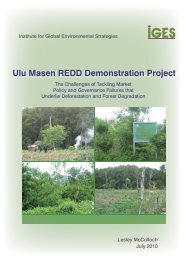pdf 1242 KByte - JIKO
pdf 1242 KByte - JIKO
pdf 1242 KByte - JIKO
You also want an ePaper? Increase the reach of your titles
YUMPU automatically turns print PDFs into web optimized ePapers that Google loves.
Policy Paper: Assessing prerequisites for market-based REDD+ activities 17<br />
includes several aspects: broadly, “free” means communities cannot be forced to participate in decision making<br />
while the term “prior” stresses the fact that consultation have to take place before activities are implemented<br />
or land for such activities is being allocated. “Informed” means communities have to be given understandable<br />
information on potential impacts of the planned activity and on their participation possibilities.<br />
Furthermore, governments must inform communities on the results of the consultations and the final decisions.<br />
The term “consent” requires communities to approve the activities in question before they are being<br />
implemented (IIED 2011).<br />
Since FPIC is a relative new concept of international law and policy, it is not yet well established as a principle<br />
in most national legal systems and often neglected (Anderson 2011). REDD+ countries would therefore<br />
need to establish respective principles and develop institutions and procedures that allow for the participation<br />
of affected communities. Once respective legal provisions on participation of REDD+ activities are in place,<br />
FPIC would represent a legal obligation binding both, the national government and proponents of REDD+<br />
activities (Morgera 2009). While it can be expected that the requirements at international level will be further<br />
developed in the future, the diversity of potential REDD+ countries makes it necessary to leave enough room<br />
for individual design of the participation mechanisms by ensuring safeguards are respected.<br />
The safeguards on the preservation of biological diversity contained in the Cancún Agreements explicitly<br />
mention the risk of conversion of natural forests (UNFCCC 2011, Appendix I para 2 (e)). An operational<br />
basis for the implementation of this safeguard is, however, missing. In order to make the safeguard more<br />
operational, UNFCCC negotiators will have to agree on adequate definitions and specify concepts such as<br />
Sustainable Management of Forests (Pistorius et al. 2011). However, as it is the case for social safeguards,<br />
UNFCCC should provide safeguard provisions that are as specific as possible while at the same time taking<br />
into consideration existing differences between REDD+ countries.<br />
Hence, international provisions will have to be reconciled with national regulations and countries will need<br />
to develop particular biodiversity safeguards and make decisions on which and how benefits are to be<br />
reached. In order to implement those safeguards, country specific biodiversity principles will have to be established<br />
that take into account national circumstances and priorities. They can provide a foundation for further<br />
elaborating criteria and indicators that would allow for monitoring of the biodiversity safeguards<br />
(Pistorius et al. 2011). In defining national biodiversity standards, countries can draw important lessons from<br />
other existing UN Conventions. The UN Convention on Biological Diversity (CBD), for example, can support<br />
countries in developing national objectives and indicators. The REDD+ social and environmental standards<br />
(REDD+ SES) developed in a process facilitated by CARE International and the Climate Community<br />
and Biodiversity Alliance (CCBA) can further give assistance and orientation in developing national standards,<br />
which could direct and guide national implementation of REDD+ and demonstrate consistency with<br />
the UNFCCC safeguards (Dickson et al. 2009).<br />
However, the development of social and environmental standards and principles at the national level will not<br />
automatically lead to their materialization on the ground. Reflecting these concerns about the provisions<br />
remaining mere paper tigers Parties in Cancun agreed to the development of guidelines for establishing<br />
Safeguard Information Systems (SIS) at the national level. In order to elaborate these guidelines, the Subsidiary<br />
Body of Scientific and Technical Advice (SBSTA) invited Parties and Observers to submit their<br />
views on the role of the SIS, the information Parties should provide and how these should be collected and<br />
provided. According to several submissions the main function of a SIS would be to provide regular information<br />
on how REDD+ safeguards are being addressed and respected. Several Parties and Observers call for<br />
Nicolas Kreibich, Christof Arens and Wolfgang Sterk<br />
Wuppertal Institute




